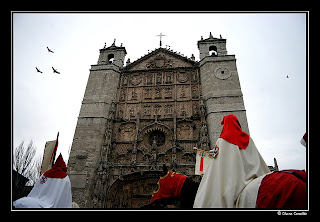Non Sum Dignus
 Hell is heaven viewed from the other side.
Hell is heaven viewed from the other side.
As a Christian, and especially as a Catholic, I often get asked what it was like to live my life under the shadow of guilt. This question undoubtedly puzzled me, and in many ways it still does: I am a hedonist when I am not being watched, and my sins have become as a river of scarlet before the throne of Lord, so many they are, and so grievous, that they all cry to Him for vengeance. Of course, I try to live my life free from worldliness as much as possible; but in a heavily secularized environment, even here in Catholic Philippines, it is difficult not to give in to the temptations around me.
I am not trying to justify my behavior, nor am I trying to say that I can sin and sin, since I can always avail of the sacrament of penance. That would simply be antithetical to authentic Christian doctrine. Yet why do we sin? Why do we, even in the face of irreformable Church teaching, sometimes persist in our errors? I don't know the answer to that question. Perhaps there is no clear answer. I can yap all day along about our fallen nature, how concupiscence drives us to test the waters of temptation, and perhaps I could even differentiate what delectatio morosa is from desiderium pravum or gaudium peccaminosum. But in the end, theology can never fully explain why we do such things. And saying that it is because 'we are only human' is the biggest BS answer of all, I think.
Sometimes we desire spiritual perfection too much that we are plunged even deeper into the darkness. We want ourselves to become like angels, to possess the divine ardour of the seraphim, for example, that we forget the fact that we are human: made in the image and likeness of God Himself. We desire to expunge all 'impurities' and 'defects' from our system that we end up trying to portray ourselves as something we are inherently not. Does this not remind us of Isaiah 14:12?
God did not become Man for angels. God did not suffer for the thrones. God did not endure mockery and humiliation for the dominions. He did not die for the seraphim. He did all these things for you and me. He loved us so much that He was even willing to 'spoil' us in the process.
So why do we want so much to become like angels? Did not the Son of God's Incarnation forever raise the dignity and glory of this frail human body to the heights of heaven? Think about it: only humans can offer the Mass; not even one among the angels, even St. Michael himself, possesses this singular distinction. Is it perhaps because we want ourselves to be God's favorite pet that we want to achieve spiritual perfection so bady-- even to the point of despair?
Umberto Eco, in his extraordinary book The Name of the Rose, is quick to point to the reader that Hell is essentially Heaven viewed from the other side. Catholicism, after all, is not about being the 'perfect' guy, the 'perfect' husband or the absolute perfect man. Many, many, MANY Catholics have been grave sinners. We count popes, saints-- even doctors and fathers of the Church-- among the ranks of sinners. But then again, how can gold be purified without fire? Are we so arrogant as to say we have no need of it?
The Christians of the East, specifically the Orthodox, teach that heaven and hell are basically the same thing-- the endless, eternal outpouring of God's immense ocean of love. For the virtuous, this love is pure bliss, unending beatitude; but for the damned, this love is a source of everlasting woe at having rejected so great a reward. It is a love that burns, and it haunts their memories unto the ages of ages.
If there is any moral to this story, it is this: the single most important precept in being Catholic is the acknowledgment that we are all ultimately sinners. It is not our role to have the same ardour as the glorious seraphim; rather, through our imperfections, we must let the splendor of the Creator shine in its fullest. We need to wake up to the fact that we are humans: frail, weak, burdened by concupiscene, yet at the same time forever honored by having been bought from sin and death at so great a price. Christ Himself stumbled, and fell down three times when carrying His Cross; we must remember that we, too, can fall sometimes. We need to forgive ourselves, and carry our own crosses with the dignity which we have been so greatly gifted.
















No comments:
Post a Comment